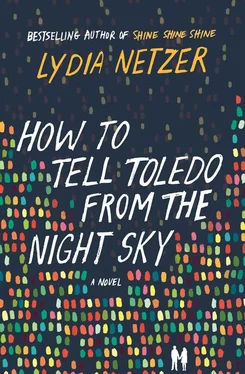“George, she did it.” Dr. Bryant gasped.
“Really, well, here’s to another happy twenty-five years then, sir. That’s—”
“No, no, no,” he stammered on. “I’m talking about that strange young woman in Pittsburgh. Irene Sparks.”
“Oh, yes,” said George. “As I recall, she was determined there are black holes in tea.” George began to pack up his bag.
“That’s right. That’s her,” said Dr. Bryant. “Not tea, though. She was here for an interview, years ago. She had schematics for a microcollider.”
“Well? Has she collided something?”
“George, she has. She’s got—you know—what you might call black holes. In a collider she fabricated in Pittsburgh, can you imagine? The whole experiment is the size of a small truck! Hawking radiation, detectable with a human retina. Apparently … it actually glowed.”
“That’s not possible,” said George. He picked up his briefcase and made for the door, his office, his pain medication. But Dr. Bryant followed him.
“She’s got numbers. The radiation loss has been charted. And I’ve seen an image. With my own eyes.”
George frowned. He stopped short of the door. “So what does this mean for … downstairs?” He dropped his voice to a whisper and pointed toward the floor. Dr. Bryant came close.
“I think we’re going to be able to get her here, George. She could be the crown jewel of the whole project!”
“I see,” said George. “So, is she going to be teaching?”
“Who cares about that?” Dr. Bryant said. “Teaching? What does that even mean? We were the first call she made, George. That’s something, isn’t it?”
“Interesting,” said George.
“Oh, wait until you see it,” Dr. Bryant said. “I want to get her here before … Discover … Time … you know what a frenzy this will cause. When she talks to the media.”
George put his hand on Dr. Bryant’s shoulder. The old man seemed about to keel over.
“Are you alright?” he said. “You seem … crazy.”
“I’m going down to admin,” he said. “I’m going to put in a proposal right now, this minute. I’m going to have her here by the end of tomorrow,” said Dr. Bryant. “It’s imperative. How could we have been such fools to let her slip away?” He was looking at George as if he could hardly remember George’s name.
“OK, doc,” he called after him. “If you say so. Just don’t give her my office, alright?”
“Oh, George,” Dr. Bryant turned and called back. “I can’t believe I forgot—that’s what I really needed to see you about. We are giving her your lab. And you’ll need to be out of there by tomorrow. Thanks for understanding.”
As he watched Dr. Bryant bustle out into the hallway and away, the pain in his head almost forced George’s right eyelid to close, and George could suddenly think of nothing else but to get to his office, turn out the light, and die. But then he had a sudden thought. A different thought, and his hand shot out to push the door open so he could call down the hall.
“Dr. Bryant?” George bellowed. “What color hair does she have?”
“Hair?” said the older man. “Hair? It’s brown, I think. Brown hair. How can it possibly matter?”
And then he was gone, leaving George to wonder if it could.
Irene walked home. She felt light, strange, evacuated, like she was already having her breakthrough article translated into Czechoslovakian. When she had sent her data to Toledo, they’d asked her to come immediately. Looking at her numbers, they were already sure, like a coroner standing over a broken neck, sure it was broken.
What would her mother have said about this, had she not fallen down the stairs and died this afternoon? What would her mother have said if Irene had turned up on her doorstep. Oh, Irene, she might have said. You’re back in Toledo. It’s everything I ever wanted. Would she even have been able to go to Toledo, if her mother had never fallen in the first place? If she had never wandered out into the upstairs hall, taken a misstep, taken a tumble.
She opened the front door to her apartment and a rush of cool air escaped. Irene’s apartment was spare. There were no houseplants; there were no Parisian advertisements on the wall. Irene was not a decorator. She was not a homemaker, nor was she a person who was comfortable in rooms that were collected into an idea called: home.
Irene tossed her backpack on the kitchen counter, picked up a plastic cup, and drew a pint of water from the fridge door. She drank, and let guilt wash into her. She should have stayed with her mother so that her mother was not alone. No one should die alone, not even drunks. She set the empty cup down on the counter. “Come back,” her mother had said, on a postcard that Irene had thrown into the trash. Because she knew that if she did come back, it would be, “Welcome backits beautiful beautiful beautifulbyerful,” and when the words all ran together in her mother’s mouth, Irene would have to fall off a bridge. Sometimes you just have to keep away from the things that are trying to kill you, even if they’re the same thing that gave birth to you. Sometimes those two things are the same, and their name is mother.
She left the kitchen and went back through the apartment into the back room, where the lights were dim and her boyfriend, Belion, was hunched over his keyboard. There were three monitors spread out before him, and his giant hands tapped aggressively. Belion was huge, both in literal frame and in personal aspect, the kind of person who sends out ripples into the room, seeming to bump into the walls even when they’re in the center. He had long, curly black hair that lay over his bulky shoulders like an animal. His hand shot out and moved the mouse around, clicked three times.
“What the hell, Irene,” Belion growled.
“What the hell, babe,” she returned. She walked over to him and leaned against the vastness of his back. It hulked up over the back of his rolling office chair.
“What the hell, for real, though,” he said. “This person is driving me batshit.”
“Where?” said Irene, looking around.
“In the game,” said Belion.
Belion was a game designer and coder for an online fantasy role-playing game. The name which his mother had given to him when he was born was Arturo, but he had it legally changed to Belion. His online name was Belion, Archmage of the Underdark, but he had not changed his legal name all the way to that.
Irene lifted up one of his arms and crawled under it and into his lap. She sat on one thigh, her arm around his collar, hand threaded through under the fall of his hair. She rested her head against his cheek. She pressed her forehead into the firm shape of his jaw.
“Dammit,” he muttered. “There she goes again. Somebody’s renaming all the bears around my L-shaped cottage. They’re all ‘Good-bye Silvergirl’ or ‘Farewell Silvergirl’ or ‘So long Silvergirl.’”
“Rude.”
“Yeah, rude.”
“Bears should just be called ‘a bear.’”
“Yeah, you know what, I’m lifting the rename command from players, unless the animal is a pet.”
“At least until this Silvergirl person kills herself and her account goes dead. Sounds like it might be any minute.”
This made Belion turn his big head around and frown at Irene. She shrugged, “It does!”
“Can’t have the fucking bears around my L-shaped cottage all wandering around like a pack of greeting cards or something.”
“What does she look like? This Silvergirl?”
“I don’t know. Never seen her.”
Irene began to cry again. Still in the circle of his arms, she put her hands in her lap and tears fell down her face.
Читать дальше












